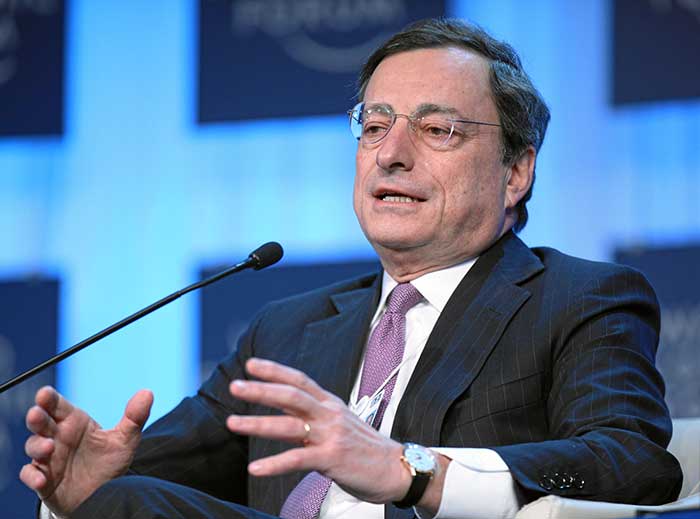web_mario_draghi_-_world_economic_forum_annual_meeting_2012.jpg

Mario Draghi, president of the European Central Bank
Speaking in front of MEPs on the European Union’s committee on economic and monetary affairs (ECON) yesterday, Draghi said that the gradual growth in the eurozone is on track to continue, “not least owing” to the bank’s unprecedented monetary policy stimulus.
However, he stressed that monetary measures “cannot be the only game in town” and will not generate sustainable and balanced growth alone.
“To increase the effectiveness of monetary policy, fiscal and structural policies are needed to reinforce growth and make it more inclusive,” he stated.
International institutions like the International Monetary Fund and the OECD have been plugging this approach for some time.
Earlier this month, the European Commission called time on years of commitment to austerity, pushing the 19 members of the eurozone to loosen their budgets and pursue a fiscal expansion worth 0.5% of GDP in the bloc next year.
Pierre Moscovic, economic and financial affairs commissioner, noted however that the recommendation only applies to those who have “budgetary leeway”.
Namely, this means Germany, the bloc’s largest economy, which has been running at a small surplus (0.7% of GDP last year).
However, Germany has rejected moves by the commission to interfere in member states’ spending, and continues to resist spending increases despite having the fiscal room.
Jereon Dijsselbloem echoed these remarks today, Reuters reports, suggesting the commission focus on its job to enforce strict EU budget rules.
But the ECB’s Draghi is yearning for more spending. He subscribes to the idea that monetary policy has reached its limits, and support from other policy areas will be necessary to boost growth any further.
While he was optimistic about EU and global growth in the future, he highlighted risks from uncertainty and the UK’s decision to leave the EU.
However, he suggested Brexit would harm the UK more than the eurozone. Potential impacts in terms of trade, migration and foreign investment “would first and foremost weigh on the UK economy” while having some “limited adverse spillover” effects on the euro area, he said.
He called for a speedy end to the negotiations and the uncertainty they generate, and said the exit process should conclude “as soon as possible”.
Once that happens, the single market “cannot go backwards”, he stressed. “It is imperative that the integrity and homogeneity of the rules and their enforcement will be preserved. In fact, it is essential to further strengthen and develop the single market.”
He also called for a “united” Europe that acts together and works to overcome the “vulnerabilities stemming from its incompleteness”.
“One important lesson from the crisis is that a half-built house is not stable, it is fragile,” he stated.
Also speaking yesterday, Benoît Cœuré, ECB executive board member, discussed Greece and the country’s potential participation in the ECB’s quantitative easing stimulus programme, which consists of an €80bn per month bond-buying programme.
He said the issue of debt sustainability – Greece has a colossal debt pile, worth 180% of economic output, and is currently negotiating with reluctant creditors for relief – will be an important input.
The decision to allow Greece into the programme or not will be taken in “full independence”, he stressed.
He did emphasise Greece’s commitment to reforms, however: “To bring the programme to a successful conclusion and restore market access for the [country] on a lasting basis, it is above all essential that the Greek authorities continue to show a serious commitment to the goals and measures taken under the programme.
“Only if this happens can all stakeholders be confident that reforms will not be reversed and in fact be strengthened after the programme.”












